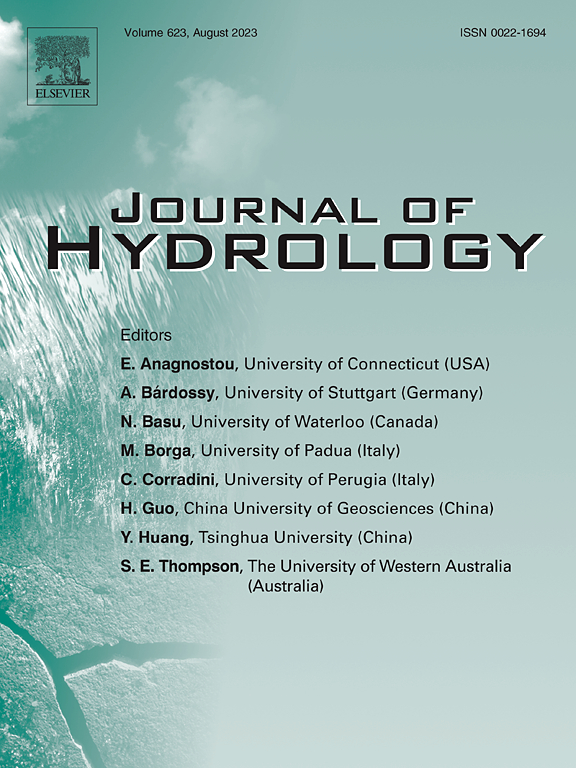Stochastic optimization to maximize water supply index in conjunctive use of surface and groundwater
IF 5.9
1区 地球科学
Q1 ENGINEERING, CIVIL
引用次数: 0
Abstract
Systematic operation of water resources systems requires rules that consider the uncertainties affecting system performance. Here, stochastic dynamic programming (SDP) is used to structure and solve a full-scale surface and groundwater conjunctive use model to derive a multiparameter operational policy (rule) that maximizes the water supply index (). The model uses a Markovian representation of inflows to account for hydrologic uncertainties. Both the reliability of allocated water and its vulnerability are employed to define the . To overcome the computational burden inherent with SDP, infeasible solutions are identified and removed from the model solution process. Optimal expected values of and surface and groundwater uses are assessed. The system simulation model with embedded rules is executed to assess the performance of the derived rules. The derived rules employ water rationing and account for long-term benefits during periods when the available surface and groundwater resources may suffice to meet demand. The simulation results demonstrate that the derived operational rules produce high values for the long-term operation of the system and ensure sustainable groundwater use.
地表水和地下水联合利用中供水指标最大化的随机优化
水资源系统的系统运行需要考虑影响系统性能的不确定性的规则。本文采用随机动态规划(SDP)构建和求解全尺寸地表水和地下水联合利用模型,推导出最大化供水指数(WSI)的多参数操作策略(规则)。该模型使用流入的马尔可夫表示来解释水文的不确定性。用水的可靠性和脆弱性被用来定义WSI。为了克服SDP固有的计算负担,识别不可行的解并从模型求解过程中删除。评估了WSI、地表水和地下水利用的最佳期望值。执行嵌入规则的系统仿真模型,以评估派生规则的性能。推导出的规则采用水配给,并考虑到在现有的地表水和地下水资源可能足以满足需求期间的长期利益。模拟结果表明,导出的操作规则为系统的长期运行提供了较高的WSI值,保证了地下水的可持续利用。
本文章由计算机程序翻译,如有差异,请以英文原文为准。
求助全文
约1分钟内获得全文
求助全文
来源期刊

Journal of Hydrology
地学-地球科学综合
CiteScore
11.00
自引率
12.50%
发文量
1309
审稿时长
7.5 months
期刊介绍:
The Journal of Hydrology publishes original research papers and comprehensive reviews in all the subfields of the hydrological sciences including water based management and policy issues that impact on economics and society. These comprise, but are not limited to the physical, chemical, biogeochemical, stochastic and systems aspects of surface and groundwater hydrology, hydrometeorology and hydrogeology. Relevant topics incorporating the insights and methodologies of disciplines such as climatology, water resource systems, hydraulics, agrohydrology, geomorphology, soil science, instrumentation and remote sensing, civil and environmental engineering are included. Social science perspectives on hydrological problems such as resource and ecological economics, environmental sociology, psychology and behavioural science, management and policy analysis are also invited. Multi-and interdisciplinary analyses of hydrological problems are within scope. The science published in the Journal of Hydrology is relevant to catchment scales rather than exclusively to a local scale or site.
 求助内容:
求助内容: 应助结果提醒方式:
应助结果提醒方式:


